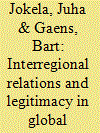|
|
|
Sort Order |
|
|
|
Items / Page
|
|
|
|
|
|
|
| Srl | Item |
| 1 |
ID:
142419


|
|
|
|
|
| Summary/Abstract |
Relations between the European Union (EU) and regional subgroups in Latin America (Mercosur, the Andean Community and Central America) are clear examples of ‘pure interregionalism’ and provide evidence of the EU's active promotion of regional integration. Within the context of these cases, this article explores what type of international power the EU wields, how interregionalism is embedded in that power, and how it is deployed. Combining strands of literature on EU–Latin American relations, interregionalism, EU external policy and power provides a framework within which interregionalism can be understood as an important normative and practical tool for the EU's external power projection. Drawing on official documentation and interviews with key individuals, the paper highlights the EU's articulation of power in interregional relations and reflects upon its mixed success. It concludes that, while imperial qualities and aspirations can be observed in the EU's penchant for interregionalism, the transformative power of the EU remains limited.
|
|
|
|
|
|
|
|
|
|
|
|
|
|
|
|
| 2 |
ID:
112868


|
|
|
|
|
| Publication |
2012.
|
| Summary/Abstract |
This article explores the ramifications of the European Union's (EU) internal legitimacy debate for its external relations. It applies the Asia-Europe Meeting (ASEM) as a case study to examine the EU's attempts to promote legitimacy in global governance, more specifically in interregional institutions. The article's theoretical framework draws from the EU's legitimacy debate. It identifies three key sources of legitimacy, namely, (i) input legitimacy or democratic control and accountability, (ii) output legitimacy or performance and achievement of core purposes, and (iii) the degree of common identity as externalised through collective representation and the articulation of shared norms and values. The empirical analysis thereafter leads to three observations. First, the EU's presence has contributed to an increased democratic involvement by ASEM's different stakeholders including parliaments and civil society. Second, purely from an institutional legitimacy perspective ASEM achieves its purpose as a forum to 'constructively engage' with Asian countries and address issues relating to global governance. Third, ASEM reveals the EU's dual identity as an intergovernmental grouping and an organisation with a gradually increasing capacity of collective representation. However, the advancement of the EU's normative objectives through ASEM has been problematic, leading to a more interest-based and pragmatic policy path. The article concludes that the EU's legitimacy debate has had a bearing on relations with Asia and, in particular, with ASEM. Importantly, and given the EU's setbacks, some elements of the 'EU's way' have proven successful in promoting democratic notions of legitimacy beyond the state.
|
|
|
|
|
|
|
|
|
|
|
|
|
|
|
|
|
|
|
|
|